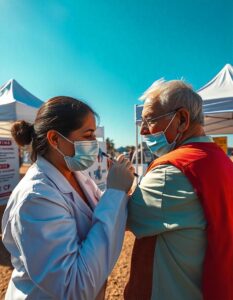Table of Contents
ToggleIntroduction
As the COVID-19 pandemic continues, scientists are uncovering new and surprising aspects of the virus. Recent research has highlighted significant findings about how COVID-19 impacts the immune system, long-term health, and even presented unexpected benefits. This article explores these discoveries, shedding light on both the beneficial and negative consequences of the virus.
Immune System Tuning and Severity
Refers to the way the immune system responds to infections, such as COVID-19, and how its response can vary in intensity. In some individuals, especially those with severe COVID-19 cases, the immune system becomes overactive, leading to excessive inflammation. This hyperactive immune response can damage tissues and organs, contributing to the severity of the disease. Research has shown that “tuning” the immune system to balance this response — enhancing the body’s ability to fight the virus while preventing harmful inflammation — could be a potential strategy to manage severe COVID 19 and improve patient outcomes.
Research from the University of Colorado at Boulder has revealed how COVID-19 affects the immune system. Scientists discovered that the severity of COVID-19 may result from an overactive immune response, leading to severe inflammation. Understanding these mechanisms can help develop treatments to manage severe cases better, potentially saving lives
Mitochondrial Damage and Multi-Organ Impact
Refers to the way corona virus causes harm to the mitochondria, the energy-producing structures within cells. The virus can disrupt mitochondrial function, leading to an overactive immune response and widespread inflammation. This damage can affect multiple organs, including the lungs, heart, and kidneys, contributing to the severe and sometimes long-lasting health problems seen in COVID 19 patients. Mitochondrial dysfunction is thought to play a key role in complications like organ failure and the development of chronic conditions, including “long COVID.” Understanding this mechanism is crucial for developing targeted treatments to mitigate these effects.
Studies by Weill Cornell Medicine indicate that SARS-CoV-2 causes severe damage to mitochondria, leading to an overactive immune response and extensive inflammation. This mitochondrial dysfunction is linked to multi-organ damage, providing insights into the long-term effects of COVID 19, including the debilitating condition known as ‘long COVID’
Unexpected Cancer-Fighting Benefits
Refers to a surprising discovery that the immune response triggered by severe corona virus might help fight certain types of cancer. Research has shown that specific immune cells activated during COVID 19 can infiltrate tumors and promote tumor shrinkage. These immune cells, which are typically involved in fighting infections, may also target and attack cancer cells, particularly in tumors like melanoma, lung, breast, and colon cancer. While this finding is still in its early stages, it opens the possibility of using COVID-19-related immune responses as a new avenue for cancer treatment, especially for advanced cancers that haven’t responded to other therapies.
In a surprising twist, researchers at Northwestern Medicine found that the immune response triggered by severe COVID19 could also combat cancer. Specific immune cells activated during COVID19 were shown to infiltrate and shrink tumors, opening new avenues for cancer treatment, particularly for patients with resistant cancers
Heart Complications in Young Patients
Refers to the increased risk of cardiovascular issues observed in younger individuals following a COVID 19 infection. Although COVID 19 is generally less severe in young people, research has shown that some may develop heart-related complications, such as myocarditis (inflammation of the heart muscle) or arrhythmias (irregular heartbeats). These conditions are often linked to the body’s immune response to the virus. While these complications are rare, they highlight the importance of monitoring heart health in young COVID-19 patients, particularly those recovering from severe infections, to prevent long-term cardiovascular damage.
A study published in BMC Cardiovascular Disorders highlights the increased risk of heart complications in young COVID-19 patients. These findings underscore the need for vigilant monitoring of heart health in young individuals post-recovery to prevent serious cardiovascular issues
Post-Lockdown Immune System Reactions
Refers to the heightened immune responses observed after the easing of COVID-19 lockdowns. During lockdowns, limited exposure to pathogens led to lower levels of inflammation and immune activity. However, as restrictions were lifted, the immune system became more reactive to common viruses and bacteria, causing stronger immune responses. This intensified reaction may increase the risk of autoimmune conditions, allergies, and other infections, as the immune system is now more sensitive and reactive than before the lockdowns. Research suggests that this shift in immune behavior could have long-term health implications.
Research from Radboud University Medical Center has observed heightened immune responses to common pathogens post-lockdown. The study suggests that reduced exposure during lockdowns led to low inflammation levels, but once restrictions eased, immune systems reacted more intensely to viruses and bacteria
Rare Complications and Emerging Variants
Refers to the unexpected and less common health issues linked to corona, as well as the development of new virus variants. While the majority of COVID cases are mild, some individuals experience rare complications like blood clots, Guillain-Barré syndrome (a neurological disorder), or organ failure. Additionally, new variants of the virus, such as Delta and Omicron, have emerged, sometimes with increased transmissibility or resistance to existing vaccines. These emerging variants can lead to more severe outbreaks or complications, making it crucial to continue monitoring and studying both rare complications and the evolving nature of the virus to improve treatment and prevention strategies.
Ongoing studies continue to uncover rare complications and new variants of corona virus. For instance, a rare case involving vancomycin-resistant Staphylococcus aureus (VRSA) linked to COVID-19 illustrates the complex interactions between the virus and other pathogens, emphasizing the need for continued vigilance and research

Conclusion
These recent discoveries offer critical insights into the multifaceted impact of COVID-19. From its profound effects on the immune system and long-term health consequences to unexpected benefits like cancer regression, understanding these findings is essential. Ongoing research and vigilance are crucial in navigating the pandemic and mitigating its diverse effects.
For further information and detailed studies, refer to the latest publications in renowned medical journals and research institutions.
For more healthand finance related updates visit our website Healthyfinancier.com

